In a piece sparked by the rediscovery of his childhood birding scrapbook, repurposed from an old maths book from the school year of 1948, Claire Todd pays tribute to her late father.
*
‘There was a boy, a very strange enchanted boy’ — Eden Ahbez
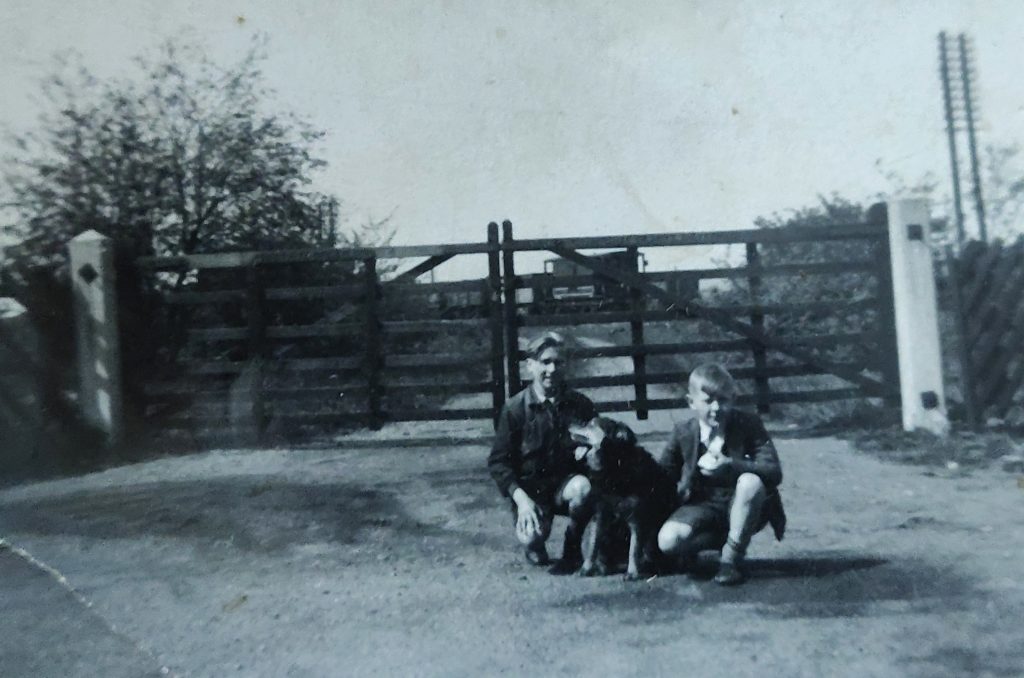
Dad aged 11 years. Dad’s Border Collie, Glen, friend Terry Barratt, Methley Junction 1948
I knew the names of most of the common British birds before I knew all of the names of my aunts and uncles. Dad and I would sit, near silent, huddled for hours overlooking the flickering waters of Fairburn Ings, in various wooden hides that dotted the shoreline. Wind played around the lap slatted sides, whilst we sat cosy inside. Him tapping me gently, quietly gesturing as to where to point the binoculars. Wide eyes to lenses.
He taught me how to differentiate a coot from a moorhen. Bald as a coot; on account of their snow-white tonsures. We would scour the reeds for ungainly grey herons then scan the shimmering, pale blue water in search of great crested grebes, always reminiscent to me of busy, bespectacled businessmen on their way to an urgent meeting. Nuthatches scrambled nearby tree trunks, wheedling unsuspecting insects from their hidey holes. In the summer we’d spot swallows and swifts, mesmerised by these superheroes of the sky, with their feats of flight and endurance, spending the majority of their life on the wing.
In late spring our thoughts would be interrupted by cuckoo calls or the ‘rat a tat tat’ of a great spotted woodpecker. On occasion, a skein of honking Canada geese would fly in low, aquaplaning in formation to a watery land, whilst over on the foreshore the distant nattering quacks of greedy mallards could be heard as they tapped visitors at the viewing point for their bready offerings. Dad was amazing at recognising birdsong. He could pick out the descending quaver of a willow warbler and the chirps and beeps of a song thrush from those of a blackbird; the joyful squee of blue tits squabbling from the sci-fi, gamma ray gun trill of greenfinches.
I loved these times with my dad. It felt like the everyday world paused for a while. I felt safe and solid. My breathing would slow and a deep sense of calmness seemed to envelope us. I recall being acutely aware of my surroundings. An overarching sensation of peace, accompanied by a perpetual lapping of water against the bank, the wind riffling through boughs and bird calls bouncing all about us. I was conscious of where the sun hung in the sky and how the light impacted on the environment. How crisp and blue the water could appear and in the next minute it would be as if a blanket of cloud had been thrown by the wind, turning the water as black as ink.
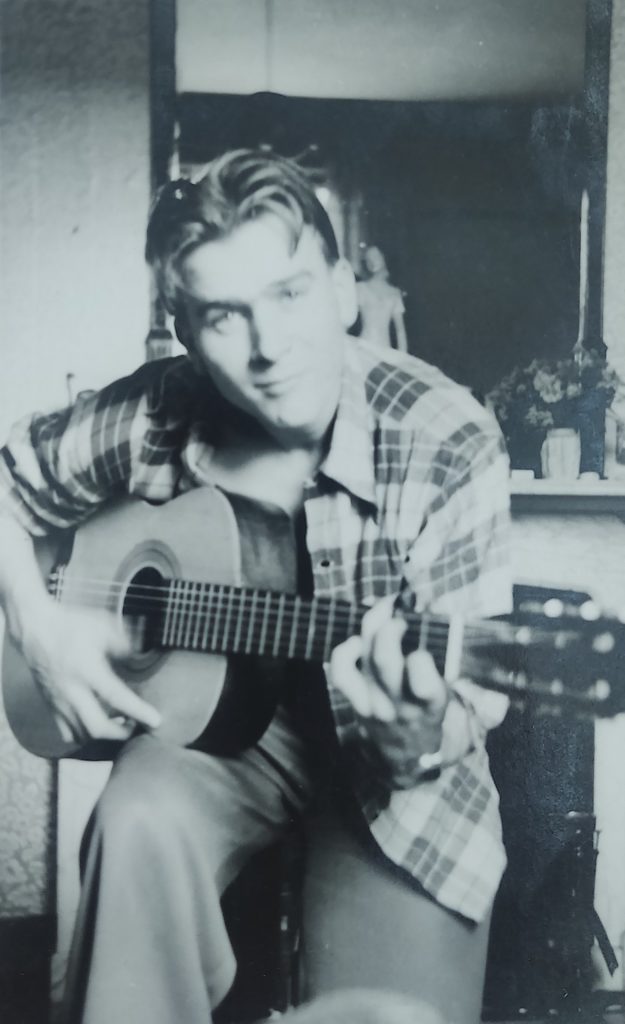
Fairburn Ings is one of my favourite places — not just on account of my memories of my dad, but because it feels otherworldly; one can still see the faint scars of bygone excavation and visible evidence that transformation is constant. Flanked by the River Aire, it was once a marshy flood plain, scuppering armies dating back to the year 655. The land was later given over to monks in the 12th century and subsequently drained in the 17th century for agricultural use. Quarries began to appear to take advantage of the rich alabaster and magnesium limestone, and by the 18th century the area was further developed for coal mining. Eventually subsidence took hold and by the turn of the following century the marshland returned and open water took form in the spaces where miners formerly toiled. With the help of two men named Bob Dickens and Dr Pickup, the local Council and National Coal Board were persuaded to designate the site as a nature reserve — a reserve that was looked after by volunteers until 1976, when it was taken over by the RSPB.
*
My dad was one of six children; fourth in line son to a bipolar coal miner and a mother with a heart of coal that could never be hewn. When his mother died in her nineties, he told me that he never remembered her saying she loved him. By all accounts it wasn’t a particularly happy home. His parents worked hard but fought even harder, and would often communicate with each other through the kids. Grandad was a rampant gambler and drinker. He would be known to disappear on pay day Friday, to return with a pocket full of empty and a blazing row on the following Monday. As a means of escape from the familial unrest, dad spent much of his time with his Border Collie, Glen, wandering and twitching the hedgerows, woodlands and banks of the River Calder and the Aire and Calder Navigation. At a time when oology was still legal, my godmother recalls how dad used to carefully blow birds’ eggs that he had found in abandoned nests on his ramblings. Delicate speckled shells bore pride of place in a handmade wooden cabinet that sat atop the marble fireplace in their home — a handsome rented victorian villa in Methley, straight out of an Enid Blyton story, known as Clayton House. We would often drive through Methley on our way home from Fairburn Ings. Another former mining town, home to Savile Colliery, surrounded by lavish woodland and agricultural land. I could see even back then the allure of the landscape.
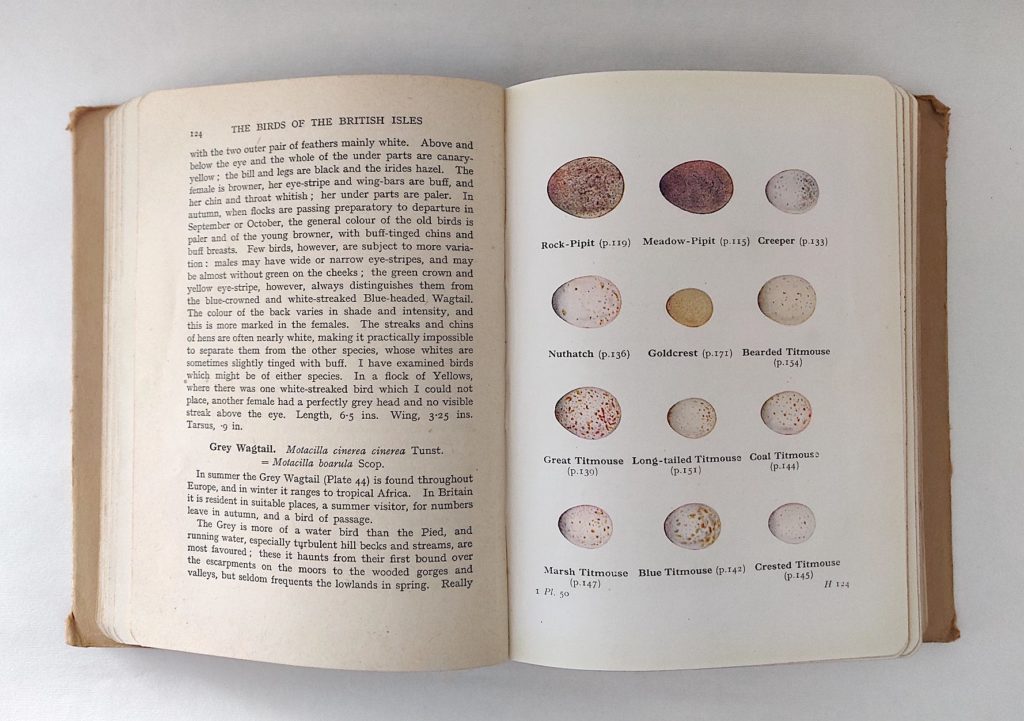
Dad was diagnosed with bipolar disorder sometime in the late nineties, or as it was known then, manic depression. Prior to this, the doctors termed these episodes as ‘nervous breakdowns’. I do remember my dad being different, but when I was really young it didn’t matter. He was kind of wondrous and animated. When he was high, he would explode with words and stories and these amazing acts of random genius. One time, he made a greenhouse in a day, with a A-frame pitch, from bits of wood, corrugated plastic and window frames that he’d cadged from the neighbours. I was maybe somewhat shielded from the darker times. Dispatched over the road to live with the neighbours, I recall with sadness being able to see into our own front room and waving at my dad, laid prostrate and sedated on the sofa. It wasn’t until I got older, when the realisation set in that he was actually ill, that it became apparent just how hard it was on all of us. This was at a time when mental health wasn’t really a thing that folk talked about or had much empathy for. That must have been really difficult for Dad.
I do believe that history has a tendency to repeat itself, whether that be in terms of a generational cycle such as that described by Strauss and Howe, or on a more personal, familial scale. I don’t know whether it was dad’s verve for birds or whether some imprint from him was genetically transferred to me, but I’ve always found birds pleasing, from their varied physiognomy, songs and silhouettes, to the perfection of symmetry and the intricacy of their plumage. I like being a snooper into their private world. Fratching and fighting, attracting and mating, nurturing and losing. An avian soap opera playing out beyond the scope of our window sills. And so, when a record was played on the stereo turntable thirty times on the spin, or the weight of seeing eyes that I knew so well had been replaced with glassy marbles that didn’t seem to see, I too would escape to the fields, woodland and hedgerows with my Border Collie, Sage. I would walk for hours being soothed by the solitude and the sounds of nature, stopping to watch the sun setting across fields of rape and corn, lulled by birdsong in the fading dusk light and feeling that same sense of calm as I did as a small child, huddled in a hide.
It got me thinking about the parallels in both of our lives. Coincidentally, I live on the same stretch of river and canal as Dad did — albeit further upstream in the city centre — and I’m perpetually amazed at the abundance of wildlife rubbing up against the bustle. I can stand on my balcony, overlooking the Leeds and Liverpool Canal, and see shoals of chub and carp basking in the weedy water below. Cormorants and red kites can often be spotted overhead and long before I glimpse the turquoise-orange arrow flash, I’ll hear the penetrating call of a kingfisher skimming the surface, on the scout for its next lookout. Grey herons regularly stalk the reeds on both the river and the canal, seeking out fishy trophies, a succulent vole or a spring duckling. Weeping willows are abuzz with long-tailed tits as they chirrup and trill in synchronised flight from branch to branch. Cawing crows, jackdaws, magpies and jays are regulars in the tree tops opposite, whilst kestrels hover atop railway sidings in search of tasty rodent titbits.
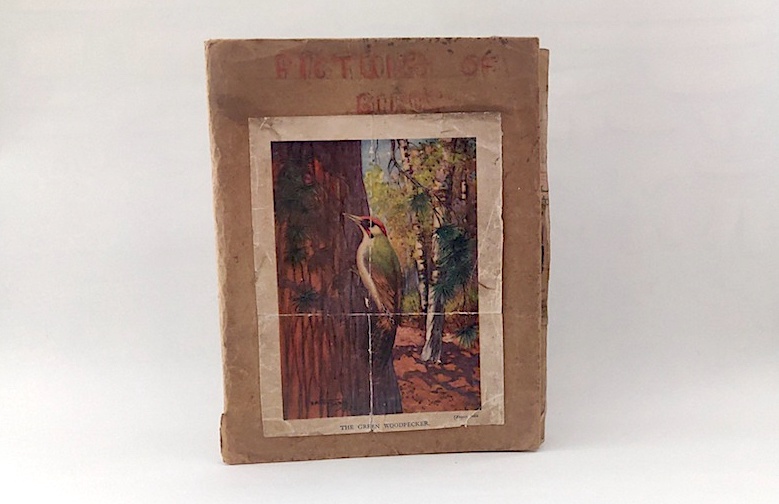
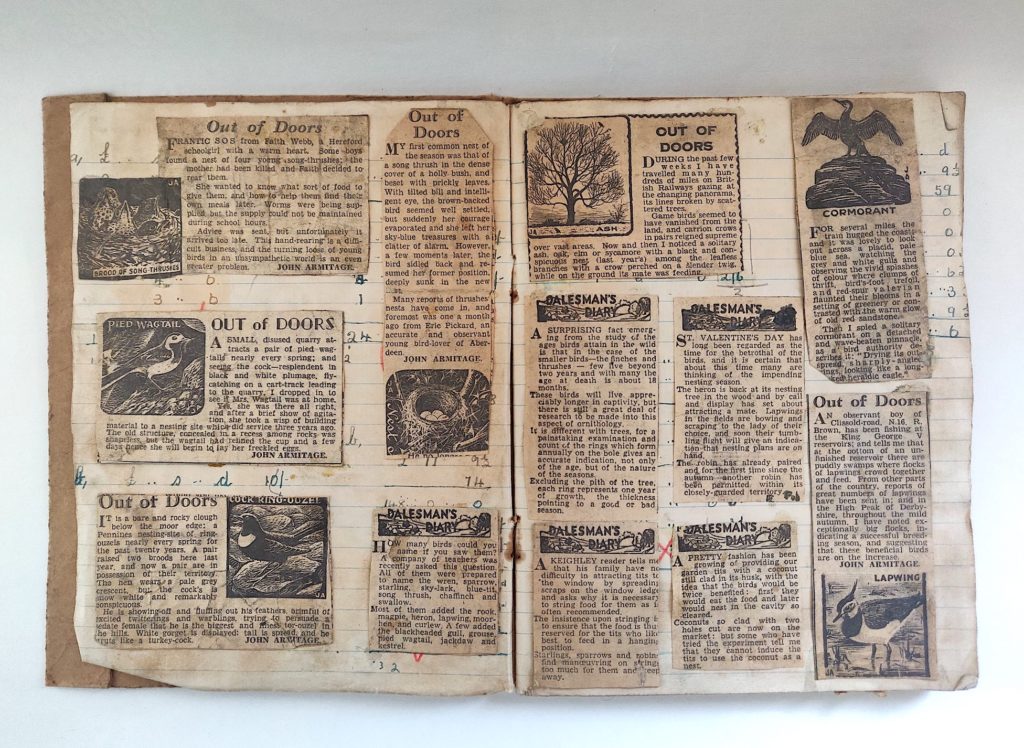
Dad’s old scrapbook, repurposed from his maths book from the school year of 1948
My bird feeders are always full year round with punk, crested blue tits, great tits and goldfinches. In spring they’re joined by blushing bullfinches and buzzing greenfinches. Robins and clumsy wood pigeons and doves peck at the leftovers and amazingly, at three floors up, ground-feeding dunnocks also often make an appearance. There are always mallards to be seen and for the last five or so years, there is at least one pair of mute swans that spawn surviving offspring. This year they had a bevy of eight cygnets. I recently spotted my first reed warbler and a grey heron chick, and my favourite of all aqua-bats, the goosander pair, have had a clutch of young just a little way up the canal. I love the walk from where I live in the centre of town out towards Armley and Kirkstall, where the remnants of once-heavy wool and industrial production give way to buddleia, rhododendron, wild roses, wild garlic, bluebells and fern, cherry trees, silver birch, horse-chestnut and hawthorn. Cleaner waters now flow and aquatic plants flourish and burst into wild water lily flowers, bullrushes and water irises. A pair of grey wagtails twitch and flit about the lock gates, their flight pendulous, like shallow swags of bunting. The banks buzz with butterflies and moths which dodge the iridescent emerald-cobalt dart of dragonflies; aerobatic waltzes performed to the noodling accompaniment of blackbirds, robins, thrushes and wrens and the squeaky sea-saw refrain from unseen bullfinches somewhere in the treetops.
*
Ernest Todd died of pneumonia on the 14 October 2012 at the age of 75. He died at home in his own bed, looking out onto the bird feeders in the back garden. He loved his garden, heavily planted with bird-friendly flora. The shrubs would grow wild and high to encourage nesting habitats and overhanging boughs would be left to hang feeders and fat balls. We chose garden and wild flowers as his floral tribute and together with Mum we arranged the order of service. We picked ‘Nature Boy’, the Django Reinhardt version, for the music for the chapel, and the lyrics were transcribed in his memorial card. We left him to the sound of a dawn chorus. As an adult, ‘Nature Boy’ still evokes Sunday mornings at home with my folks. The whiff of bacon and tomatoes cooking in the kitchen and the dulcet tones of Nat King Cole’s version, with Dad swaying and singing along on the living room rug. It’s always been synonymous with my Dad. Not just because of this memory but the connotations of the words, that speak of this strange and enchanted boy who wandered over land and sea.
It wasn’t until some years after he died, when I looked up the origins of ‘Nature Boy’, that it lent the song even more resonance. Originally penned by Eden Ahbez, prior to Nat King Cole bringing it to the mainstream, Ahbez purportedly wrote the song in tribute to his mentor Bill Pester. Pester had introduced him to Naturmensch and Lebensreform (life reform) philosophy, which was influenced by the Wandervogel (Wandering Bird) movement in Germany, that propagated a ‘back-to-nature’ lifestyle. It all seems so fitting that I should choose to associate this song and its sentiment with my own birding mentor.
Mum passed away three years after Dad, and sorting through my parents’ house after they were no longer there was the single weirdest experience I will ever know. It felt like an imposition. An imposition tinged with memories and regret; not a regret for the love and the life that we shared, but regret for all of those questions that I never thought to ask until it was too late. This piece was born from the discovery of my dad’s old and treasured bird books and the most poignant of findings — his old scrap book, made as boy after the school year of 1948. Reclaiming one of his old maths books, he had filled it with pages of clippings from The Dalesman, local newspaper ‘birding’ stories and bird cigarette cards, all interspersed with his hand-inked calculations. Flicking through the now yellowed pages, it took me back to that place that he took me to as a child and it reminded me that legacies are more than just trinkets. They can be treasuries of knowledge and a shared love of life and nature and birds. They are experiences that shaped a person and that person shaped another person. Me.
*
This is an edit of a longer piece, which you can read in full on Claire’s blog here.
Claire Todd lives and works in Leeds and is a poet, writer, artist and maker in her spare time. You can follow her on Twitter here.